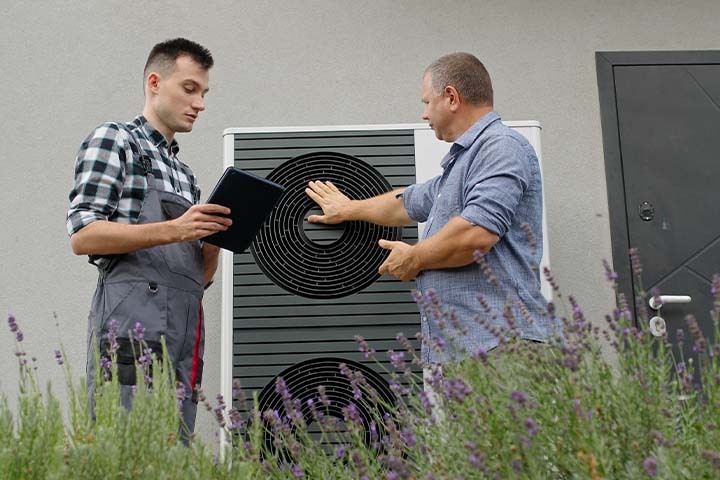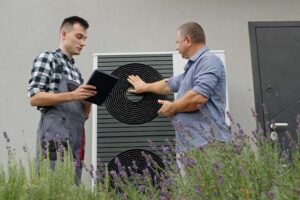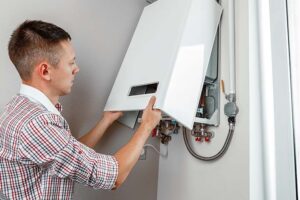Table of Contents
Many people in the UK ask, “Are heat pumps worth it?” The answer depends on your home, budget, and needs. This blog explains the pros and cons of heat pumps, including air and ground types.
You’ll learn about heat pump energy savings in the UK, the cost of heat pumps in the UK, and how they work. We’ll also cover government heat pump grants in the UK and answer questions like “Are heat pumps worth it UK pros and cons?” Let’s explore all sides to see if a heat pump is worth your money.
How Does a Heat Pump Work?
A heat pump works by moving heat, not creating it. It takes heat from the outside air, ground, or water. Then it passes through a heat exchanger and warms your home. You can also use it to make hot water.
The most common type of heat pump is the air source heat pump, which takes heat from the outside air. Ground source heat pumps get heat from the ground. There’s also a water source heat pump, but it’s less common.
Air Source Heat Pump Grants
Different Types of Heat Pumps for UK Homes
The main types are water source heat pumps, air source heat pumps and ground source heat pumps. Air-to-water heat pumps are the most used in UK homes. They send warm water to radiators and underfloor heating.
A high-temperature heat pump can work better with existing radiators. A hybrid heat pump uses a gas boiler with a heat pump. It’s good if you need extra heat. Choose the heat pump model that fits your home and type of heat needed.
Pros of Heat Pumps: Why Heat Pumps Are Getting Popular in the UK
Heat pumps are highly efficient. They give three to four units of heat for every one unit of electricity. That makes them cheaper to run than a gas boiler. Heat pumps can reduce your energy bills over time. They also lower your carbon footprint.
You’ll find them on the Energy Saving Trust website as a green choice. Heat pumps have been installed across England and Wales. They are supported by the UK government with grants.
Government Help: Grants That Lower Heat Pump Costs
One big reason people get a heat pump is the Boiler Upgrade Scheme. It offers £7,500 toward your heat pump cost. You can use it for an air or ground source heat pump installation.
If you’re low-income, the ECO4 Scheme may help fully fund your new heating system. This reduces the cost of installation and makes investing in a heat pump easier. You can get heat pump quotes from certified installers to check your savings.
Heat Pump Performance in Winter in the UK
Some ask, “How is heat pump performance in the UK winter?” Air source heat pumps can work in cold weather. Modern models work at -15°C, though the efficiency of heat pumps drops.
Ground-source heat pumps stay more stable as they take heat from the ground. If your home has poor insulation, you may need backup heating. Still, heat pumps are designed to run efficiently through UK winters when installed properly in the UK.
Disadvantages of Heat Pumps UK: What to Know Before You Buy
Let’s talk about the disadvantages of heat pumps in the UK. First, the cost of a heat pump is high—usually £8,000 to £15,000. Even with grants, that’s a lot. Also, you might need to install a heat pump with bigger radiators or underfloor heating.
That adds more costs. Another issue is space. Installing an air source heat pump needs an outdoor room. Heat pump running costs in the UK are lower, but it takes years to save back what you spent. These are real cons of heat pumps.
Are Heat Pumps Worth It in Scotland?
If you live in Scotland, you may wonder, “Are heat pumps worth it in Scotland?” Yes, in many cases. Scotland offers special help through Home Energy Scotland. You can get grants and loans to lower heat pump installation costs.
Air source heat pump efficiency in the UK is high even in colder Scottish areas. Still, it’s vital your home is insulated. With good planning, heat pumps can save energy and money in Scottish homes too.
Can a Heat Pump Replace a Gas Boiler?
You can switch a gas boiler for a heat pump, but it takes some changes. You might need bigger radiators, better insulation, or a hot water cylinder. A boiler with a heat pump setup is also possible.
This hybrid heat pump gives strong heat when needed. You’ll want to check if your home is suitable for a heat pump. Ask a pro to help. Installing a heat pump takes time but gives long-term benefits.
How Long Until a Heat Pump Pays Off?
The time it takes to save your money back depends. It may take 7 to 12 years. If you use solar panels or get grants, you save faster. Heat pumps are more efficient, and they work best in homes with good insulation.
When used right, the heat pump can reduce your bills. If you plan to stay in your home long-term, the investment in a heat pump may be worth it. Over time, you may save thousands.
Is a Heat Pump Right for You?
So, whether a heat pump is right for you depends on many things. Do you have insulation? Do you qualify for heat pump grants? Are you replacing an old boiler? Heat pumps are also great for new builds.
If you’re unsure, get a home energy survey. Compare the air and ground source heat options. Ask about different types of heat pumps. Check the heat pump uses that match your lifestyle. This will help you make a smart choice.
In A Nutshell
After looking at the pros and cons of heat pumps, we can say: Yes, they are often worth it. They are cheaper to run, eco-friendly, and backed by the UK government. But they do cost more at first.
With the ECO4 scheme and heat pump energy savings UK, many people find they’re a good long-term plan. Still, they’re not for everyone. If your home fits, and you plan ahead, a heat pump in the UK is a smart move.
Frequently Asked Questions
The only two drawbacks of heat pumps are increased use of electricity and less effectiveness in extremely cold climates. However, electricity can be avoided by using solar panels.
Some heat pumps with low refrigerant usually cause this issue when the outdoor coil freezes up after the heating mode is turned on. As a result, the heat pump is unable to provide enough heat and starts making your home cold.
Those old houses that have no or ineffective insulation are not suitable. Heat pumps are among the most efficient heating systems that are effective only in properly insulated properties.



